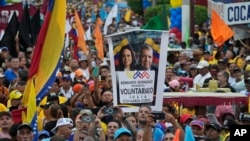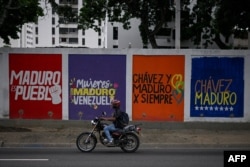The United Nations’ chief human rights official warns that Venezuela’s upcoming presidential elections are unlikely to be free and fair because widespread repression in the country prevents dissident voices from being heard.
In his latest update on the human rights situation in Venezuela, U.N. High Commissioner for Human Rights Volker Türk presents a starkly critical assessment of an autocratic government that stifles dissent by the arbitrary detention and enforced disappearance of its perceived opponents.
“My office continues to receive reports of detentions as election day approaches, including of supporters and members of the opposition. This does not augur well, and I urge a change to such practices,” said the U.N. human rights chief, who engaged in an interactive dialogue at the U.N. Human Rights Council Wednesday and Thursday.
He said his office has documented “with concern” an increase in threats, harassment and assaults against civil society actors, journalists, unionists and other voices considered critical, “including through arrests and prosecutions, and 38 cases of arbitrary detention.”
In January, the government rid itself of President Nicolas Maduro’s main opponent for the top job by barring opposition leader Maria Corina Machado from running in an election for 15 years.
In April, Venezuela’s main opposition coalition agreed to unite behind one candidate, former diplomat Edmundo Gonzalez, to challenge Maduro, a decision that many observers believe could be a winning hand.
Türk called on Venezuelan authorities to lift restrictions on civic space and “to ensure fully transparent, inclusive and participatory electoral processes, in line with international standards.”
Venezuelan objections
Alexander Gabriel Yanez Deleuze, Venezuela’s ambassador to the U.N. in Geneva, lashed back at the high commissioner’s disparagement of his government. He blamed “foreign and domestic” players of aggressive behavior aimed at undermining the sovereignty and peace in his country “that has been won thanks to the leadership of President Nicolas Maduro.”
“The high commissioner, the Venezuelan opposition, however, are calling out a fraud and are calling for violence because they do not accept the Bolivarian revolution,” he said.
He accused the United States and its acolytes of “having published communiques that are already written today” and that are aimed at subverting the election.
He said this ploy will not work. “The 28th of July will see the ballot tables closed and the electoral council counting all the votes. There will be 17 different auditors before, during and after the election, and we will be announcing the result, which is part of the people's resistance,” he said.
Opposition detentions
Türk was not persuaded by this argument and reiterated his appeal for the government to refrain “from adopting legislation that would further restrict the right to participate in public affairs, and the freedoms of association and expression.”
He also reiterated his call for the release of all people who have been arbitrarily detained in Venezuela, including those remaining in pretrial detention beyond the limits set out in national law.
According to the report, between April 2023 and February 2024, U.N. human rights monitors conducted nine visits to detention centers in five states across the country and interviewed 146 people deprived of their liberty, “with a view to improving detention conditions, including access to health and food.”
Among the findings, the high commissioner said he was particularly worried about reports of intimidation and ill-treatment of inmates who had been transferred to the Rodeo maximum security prison, “as well as of their relatives and lawyers.”
“I remain concerned that people continue to be charged with terrorism-related offenses that do not comply with international human rights standards … and where there are also issues with the right to a fair trial,” he said.
In the past year, the high commissioner’s office has documented 29 cases of individuals prosecuted for terrorism-related offenses and 28 cases of detained individuals, “some perceived as dissident voices, whose whereabouts have been concealed from their relatives and lawyers.”
Türk said: “This occurred for periods ranging from two to 41 days, thus amounting to enforced disappearance. All allegations of enforced disappearances must be investigated and prosecuted, and the practice must end.”












